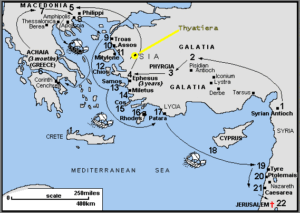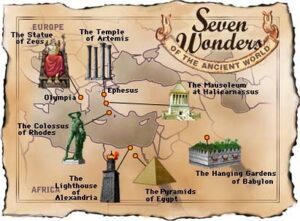“There they crucified Him and two others with Him, one on either side, with Jesus between them. And Pilate posted a sign over Him reading, ‘Jesus of Narazereth, The King of the Jews.’ The place where Jesus was crucified was near the city; and the signboard was written in Hebrew, Latin, and Greek, so many people read it” (John 19:18-20 TLB).
Crucifixion was designed to produce a slow death with a maximum degree of pain and suffering. It was one of the most disgraceful and cruel methods of capital punishment, and was usually reserved exclusively for revolutionaries and notorious criminals.
Upon arriving at the site of crucifixion, the prisoner was typically stripped of his clothing and bound with ropes or nailed to the crossbar he had carried. Those who were nailed to their crosses, as Jesus was, were secured with large spikes. Those spikes were estimated to be approximately 7 inches (18 cm) long and 1/3 inch (.75 cm) wide at the head.
Following this, the horizontal portion of the cross (or patibulum) was secured to a vertical pole (or “stipe”). Then the victim’s feet were nailed into it. During this time, a statement of charges against the crucified prisoner was typically hung above the victim’s head. In Jesus’ case, it read: “The King of the Jews,” the description of His alleged crime.
“And the people passing by hurled abuse, shaking their heads at Him and saying, ‘So! You can destroy the Temple and build it again in three days, can you? Well then, come down from that cross if you are the Son of God!’ And the chief priest and Jewish leaders also mocked him. ‘He saved others,’ they scoffed, but He can’t save Himself!
So, you are the King of Israel, are you? Come down from the cross and we’ll believe you! He trusted God- let God show His approval by delivering Him! Didn’t He say, ‘I am God’s Son?'” (Matthew 27:39-43 TLB).
As the prisoner hung on his cross, his respiratory muscles would slowly lose their ability to function. While air could be drawn into the lungs, it could not be exhaled properly. To breathe, the victim would have to push himself up against the nail that held his feet. If he failed to do so, suffocation would result.
Crucified prisoners typically suffered from extreme thirst and and muscular cramping. Insects might gather around the victim, especially if he had been hanging for an extended period. Birds of prey might swoop down and peck at the wounds of the defenseless victims. These horrific scenes depict the way in which the crucified would spend their final hours.


 Before we continue with our look at this subject, we should first be clear that “tolerance” is very important when speaking of things like freedom from bigotry or the ability to be patient and fair with others. The Bible supports this concept of tolerance in verses such as Titus 3:2 where we are told that Christians “…must not speak evil of anyone, nor quarrel, but be gentle and truly courteous to all” (TLB). We also find support for this idea in the following passage from the New Testament book of Ephesians: “Be completely humble and gentle; be patient, bearing with one another in love” (Ephesians 4:2 NIV).
Before we continue with our look at this subject, we should first be clear that “tolerance” is very important when speaking of things like freedom from bigotry or the ability to be patient and fair with others. The Bible supports this concept of tolerance in verses such as Titus 3:2 where we are told that Christians “…must not speak evil of anyone, nor quarrel, but be gentle and truly courteous to all” (TLB). We also find support for this idea in the following passage from the New Testament book of Ephesians: “Be completely humble and gentle; be patient, bearing with one another in love” (Ephesians 4:2 NIV). The city of Thyatira was located off a secondary road between the cities of Pergamum (whose church received the second letter from Jesus) and Sardis (whose letter appears in the following chapter). While there is evidence to show that there was some industrial and commercial activity in Thyatira at the time of this letter, it doesn’t seem as if Thyatira was a prominent city during that time.
The city of Thyatira was located off a secondary road between the cities of Pergamum (whose church received the second letter from Jesus) and Sardis (whose letter appears in the following chapter). While there is evidence to show that there was some industrial and commercial activity in Thyatira at the time of this letter, it doesn’t seem as if Thyatira was a prominent city during that time. The Old Testament book of Ecclesiastes further illustrates the challenge facing those who are driven to accumulate financial wealth and/or material possessions: “He who loves money shall never have enough. The foolishness of thinking that wealth brings happiness! The more you have, the more you spend, right up to the limits of your income…” (Ecclesiastes 5:10-11 TLB).
The Old Testament book of Ecclesiastes further illustrates the challenge facing those who are driven to accumulate financial wealth and/or material possessions: “He who loves money shall never have enough. The foolishness of thinking that wealth brings happiness! The more you have, the more you spend, right up to the limits of your income…” (Ecclesiastes 5:10-11 TLB). The Roman Empire ruled over most of the known world in the era when the book of Revelation was originally written. One strategy employed by the Empire to help ensure loyalty among its citizens involved a requirement to worship the Roman Emperor as a divine being. Those who lived within the Roman Empire were required to burn incense once a year in honor of the Emperor and publicly affirm his divinity. Once a citizen fulfilled that requirement, he or she received a certificate of loyalty to the Roman Empire.
The Roman Empire ruled over most of the known world in the era when the book of Revelation was originally written. One strategy employed by the Empire to help ensure loyalty among its citizens involved a requirement to worship the Roman Emperor as a divine being. Those who lived within the Roman Empire were required to burn incense once a year in honor of the Emperor and publicly affirm his divinity. Once a citizen fulfilled that requirement, he or she received a certificate of loyalty to the Roman Empire. In our text from the Gospel of Mark, Jesus informs us that humanity’s primary job description involves the responsibility to love God with all our heart, soul, mind, and strength. Thus, our highest-ranking love should be expressed toward God. Unfortunately, it seems as if the Christians in Ephesus were so busy doing good things that they forgot the most important thing: to love God first and foremost.
In our text from the Gospel of Mark, Jesus informs us that humanity’s primary job description involves the responsibility to love God with all our heart, soul, mind, and strength. Thus, our highest-ranking love should be expressed toward God. Unfortunately, it seems as if the Christians in Ephesus were so busy doing good things that they forgot the most important thing: to love God first and foremost. Judging from this portion of Jesus’ letter, we may conclude that the church at Ephesus featured a group of individuals who refused to give up, even during times of hardship. If the Christians at Ephesus “patiently suffered” for their belief in Christ, then it can only mean that they remained steadfast in their commitment to Him despite the trials, adversities, and difficulties they encountered. It also seems reasonable to assume that the members of the Ephesian church displayed unwavering determination and resilience in the face of various challenges. Finally, we can say that the Ephesian Christians exhibited faithfulness in dealing with stressful conditions.
Judging from this portion of Jesus’ letter, we may conclude that the church at Ephesus featured a group of individuals who refused to give up, even during times of hardship. If the Christians at Ephesus “patiently suffered” for their belief in Christ, then it can only mean that they remained steadfast in their commitment to Him despite the trials, adversities, and difficulties they encountered. It also seems reasonable to assume that the members of the Ephesian church displayed unwavering determination and resilience in the face of various challenges. Finally, we can say that the Ephesian Christians exhibited faithfulness in dealing with stressful conditions. Ephesus boasted a large theatre with a seating capacity of approximately 20-30,000 people that appears in
Ephesus boasted a large theatre with a seating capacity of approximately 20-30,000 people that appears in  Imagine if Jesus wrote a personal letter to your church. What would He say in that message? Would His message be complimentary, or would He emphasize the need for change and improvement? Well, the answers to those questions were not a matter of speculation for seven churches of the New Testament era. Instead, Jesus provided those answers in the form of a personalized message to each church.
Imagine if Jesus wrote a personal letter to your church. What would He say in that message? Would His message be complimentary, or would He emphasize the need for change and improvement? Well, the answers to those questions were not a matter of speculation for seven churches of the New Testament era. Instead, Jesus provided those answers in the form of a personalized message to each church. So Revelation 1:19 provides us with a reference to the past (“what you have seen“), the present (“what is“), and the future (“what will take place after this“), all within a single verse. That being said, how do we know when the future begins in the book of Revelation? How can we separate the present from the future within this book?
So Revelation 1:19 provides us with a reference to the past (“what you have seen“), the present (“what is“), and the future (“what will take place after this“), all within a single verse. That being said, how do we know when the future begins in the book of Revelation? How can we separate the present from the future within this book? The seven churches discussed in this text were not symbolic representations; they were actual churches that existed in John’s era. In fact, one can embark on a tour of these church locations today. The distance between these congregations varied from approximately thirty to fifty miles (48 to 80 km), and a first-century messenger would likely distribute this book in the order mentioned here.
The seven churches discussed in this text were not symbolic representations; they were actual churches that existed in John’s era. In fact, one can embark on a tour of these church locations today. The distance between these congregations varied from approximately thirty to fifty miles (48 to 80 km), and a first-century messenger would likely distribute this book in the order mentioned here.
 In the original language of this passage, Alpha and Omega function much like the letters A and Z, for they each represent the first and last letters of their respective alphabets. Thus, we can understand this reference to mean that Jesus is the first, the last, and the “A to Z” of everything. Therefore, our text from Revelation 1:8 establishes Jesus as the beginning and the end of all things.
In the original language of this passage, Alpha and Omega function much like the letters A and Z, for they each represent the first and last letters of their respective alphabets. Thus, we can understand this reference to mean that Jesus is the first, the last, and the “A to Z” of everything. Therefore, our text from Revelation 1:8 establishes Jesus as the beginning and the end of all things.
 One notable aspect of Revelation 1:4 involves the repetition of the number seven. This holds considerable significance, for the number seven recurs fifty-four times within the twenty-two chapters of Revelation.
One notable aspect of Revelation 1:4 involves the repetition of the number seven. This holds considerable significance, for the number seven recurs fifty-four times within the twenty-two chapters of Revelation.
 The Biblical book of Revelation was authored by a man named John, a person who identifies himself by name three times within this book (
The Biblical book of Revelation was authored by a man named John, a person who identifies himself by name three times within this book ( We should also note the descriptive phrase that closes this verse: “the error of the wicked.” This serves to remind us that heretical teachers are not mistaken, confused, or misguided. Instead, this passage describes such individuals as wicked…
We should also note the descriptive phrase that closes this verse: “the error of the wicked.” This serves to remind us that heretical teachers are not mistaken, confused, or misguided. Instead, this passage describes such individuals as wicked… The New Testament letter of 1 John highlights the need to evaluate the spiritual ideas and beliefs we encounter when it tells us, “Dear friends, do not believe every spirit, but test the spirits to see whether they are from God, because many false prophets have gone out into the world” (1 John 4:1 NIV). That portion of Scripture reminds us that many spiritual teachings, experiences, or supposed displays of supernatural power may not come from God.
The New Testament letter of 1 John highlights the need to evaluate the spiritual ideas and beliefs we encounter when it tells us, “Dear friends, do not believe every spirit, but test the spirits to see whether they are from God, because many false prophets have gone out into the world” (1 John 4:1 NIV). That portion of Scripture reminds us that many spiritual teachings, experiences, or supposed displays of supernatural power may not come from God.